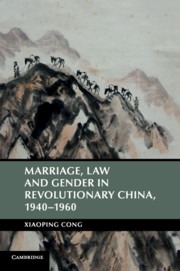Book contents
- Frontmatter
- Dedication
- Contents
- List of figures
- List of maps
- List of tables
- Acknowledgments
- Map
- Introduction
- Part I Locality, marriage practice, and women
- Part II Legal practice and new principle
- Part III Politics and gender in construction
- 5 Newspaper reports: casting a new democracy in village communities
- 6 The Qin opera and the ballad: from rebellious daughters to social mothers
- 7 The Ping opera and fi lm: nationalizing the new marriage practice and politicizing the state-family, 1949–1960
- Epilogue: “Liu Qiao'er,” law, and zizhu : beyond 1960
- Bibliography
- Index
5 - Newspaper reports: casting a new democracy in village communities
from Part III - Politics and gender in construction
Published online by Cambridge University Press: 05 September 2016
- Frontmatter
- Dedication
- Contents
- List of figures
- List of maps
- List of tables
- Acknowledgments
- Map
- Introduction
- Part I Locality, marriage practice, and women
- Part II Legal practice and new principle
- Part III Politics and gender in construction
- 5 Newspaper reports: casting a new democracy in village communities
- 6 The Qin opera and the ballad: from rebellious daughters to social mothers
- 7 The Ping opera and fi lm: nationalizing the new marriage practice and politicizing the state-family, 1949–1960
- Epilogue: “Liu Qiao'er,” law, and zizhu : beyond 1960
- Bibliography
- Index
Summary
Beginning in 1944, the case of Feng v. Zhang attracted more public attention thanks to a series of newspaper reports. Liberation Daily (LD, Jiefang ribao), the largest newspaper in the SGNBR and the official voice of the Border government and the CCP Central Committee, published an article on March 13, 1944, titled “Comrade Ma Xiwu's Way of Judging” (Ma Xiwu tongzhi de shenpan fangshi, 马锡五同志的审判方式 abbr. Ma's Way). The article used three cases to exemplify Ma Xiwu's judicial work. Feng v. Zhang represented marriage disputes, while the cases of Wang v. Wang and Ding v. Chou represented disputes over landownership. After the article's publication, other local newspapers in the BR, such as the Longdong News (Longdong bao 陇东报) and the Border Region Masses Weekly (Bianqu qunzhong bao 边区群众报), also followed suit in publishing reports, based on the LD article, of the case of Feng v. Zhang.
On October 9, 1944, LD also published a woodcut (muke hua 木刻画) titled “Comrade Ma Xiwu in Mediation” (Ma Xiwu tongzhi tiaojie susong 马锡五同志调解诉讼) by Gu Yuan (1919–96), who was one of the renowned revolutionary artists of the Yan'an period. This picture, based on the previous report in Liberation Daily, reenacted a scene in open court in which Ma was mediating the case of Feng v. Zhang. Xinhua Daily (XD, Xinhua ribao), a newspaper established by the CCP in Chongqing, the wartime capital of the Nationalist government as part of an agreement of the CCP's Second United Front with the Nationalist Party, also reported this story on October 22, 1944, under the title “A Real Case of Mediating a Marriage Dispute in the Border Region” (Bianqu tiaojie hunyin de yi ge shili 边区调解婚姻的一个实例). It singled out the story of Feng v. Zhang from the three cases reported in Liberation Daily. The same story reappeared in Xinhua Daily six months later on April 11, 1945; one of its journalists, Li Pu 李普 (1918–2010), retold the story with more details under the title “A Case of Marriage by Capture” (Yi jian qianghun an 一件抢婚案), based on previous reports from Liberation Daily and Xinhua Daily.
- Type
- Chapter
- Information
- Marriage, Law and Gender in Revolutionary China, 1940–1960 , pp. 175 - 208Publisher: Cambridge University PressPrint publication year: 2016



